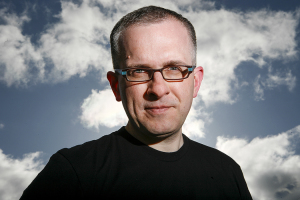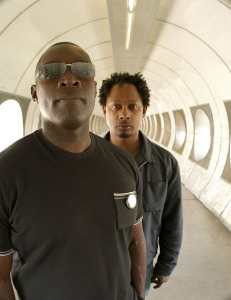Magazine

Remixing Detroit History
Techno music overtook clubs and culture in the 1990s with an electronic, never-before-heard sound. Dan Sicko, a journalist and Michigan native, determinedly documented techno’s beginnings, fighting to show that Detroit—not Europe—had birthed and incubated this musical phenomenon. The Sicko papers at the Bentley spotlight the battle to reclaim Detroit as a cultural contributor and to reveal the real roots of electronic funk.
by Robert Havey
As unlikely as it might sound, Detroit is the birthplace of techno. The electronic dance music genre started not in night clubs in Berlin or London, but in Motor City basement studios and concerts held in abandoned Detroit warehouses. Although many of the original DJs are still performing all over the world, many people still see techno as a European music trend.
Music journalist and Detroit native Dan Sicko (pronounced seek-oh) saw that the roots of Detroit techno were in danger of being forgotten. Sicko, whose papers are at the Bentley Historical Library, received his degree from the University of Detroit in 1990, just as techno was emerging into the mainstream. As a freelance journalist, Sicko wrote articles for Rolling Stone, Wired, and Urb, documenting techno’s origins. He realized that mere oral history wasn’t enough to combat the perception of techno as a European phenomenon, as a “white thing.” It was in 1997 when he started to collect materials for his book, Techno Rebels: Renegades of Electronic Funk (Wayne State University Press, 1999). The book attempts to both document Detroit’s role in the birth of techno and also to provide a long-form definition of the genre.
Detroit in the 1980s was a perfect incubator for techno’s postindustrial sound. The violence in the 1960s had passed, but the recession, white flight, and the continued collapse of the auto industry left a city half abandoned.
“Detroit is unlike any other city in the transitions it has endured,” said legendary Detroit musician Juan Atkins in a 1994 interview with Sicko in WIRED magazine. “When your surroundings change, you go through change.” After all, what’s more dystopian than gutted buildings decaying in a city’s center? What’s more sci-fi than robots replacing humans on the assembly line?
Techno’s Founding Fathers
Juan Atkins met fellow aspiring musicians Derrick May and Keven Saunderson in the late 1970s at Belleville High School. They were among the few black students in the mostly white suburb. The three bonded over their eclectic taste in music, later becoming known as the Belleville Three, and listening to everything from Parliament to Prince to the B-52’s.
The trio was particularly obsessed with the German band Kraftwerk. Musically, they were like nothing that had come before: completely synthesized instrumentation, electronically modulated voices. “Kraftwerk single-handedly moved electronic instrumentation out of the cloistered workspaces of inventors and theoreticians and into the bloodstream of popular music,” said Sicko in Techno Rebels. Kraftwerk was weird. They were otherworldly. They sounded like the future.
Detroit dance clubs that catered to teens were popular in the late ’70s and early ’80s. Kids both black and white were able to listen to new wave and euro-disco spun for them by a DJ until they headed home, bleary-eyed, at 6:00 a.m. the next morning. Those clubs, oases of culture and activity in the malaise of Detroit, provided a formative experience for many who were regulars, including Dan Sicko and the Belleville Three. It provided a way to hear new music and presented work opportunities for young DJs. Said Derrick May about the parties in Techno Rebels: “… playing for all those kids and organizations—for us it was dress rehearsal.”
Atkins was the first of the Belleville Three to break through with his own music. He formed the group Cybotron in 1980 with his college roommate Rick Davis and released the song “Alleys of your Mind.” Described by a music journalist as “a little ditty about paranoia and thought control,” the single sold 15,000 copies. Legendary radio jock the Electrifying Mojo put songs by Atkins and his peers on heavy rotation on Detroit music stations. It was the start of a movement.
Exporting Techno
Word of the new sound coming from Detroit spread across the Atlantic. In 1988, Virgin Records wanted to release a compilation album in the United Kingdom with all of Detroit’s rising stars, including May, Atkins, and Saunderson. As the record was coming together, Atkins submitted his new song “Techno City” for his contribution. The producers loved the name so much they changed the title of the record to Techno! The New Dance Sound of Detroit. This was the first time the term “techno” had been used to describe the genre as a whole. The label stuck.
Techno! didn’t do well commercially in the UK, failing to recoup the cost of production, but the album did open up a new market for Detroit musicians. Used to playing their music for small Midwest audiences, suddenly DJs were playing in front of huge crowds and being recognized on the street. The UK rave scene provided seemingly endless gigs.

Dan Sicko published Techno Rebels: Renegades of Electronic Funk in 1999, to help solidify Detroit as the birthplace of the music genre. Photo by Marvin Shaouni.
Many Detroit artists found commercial success in the early 1990s, thanks largely to a burgeoning European interest in techno. However, taking Detroit techno out of Detroit did have consequences. Cosmopolitan and capitalist influences pushed techno to be more commercial, more like other forms of electronic music. To make money, artists had to either compromise their sound or move continents (and sometimes both). Atkins said in a 1994 interview that in the United States “it’s very hard for creative thought to escape capitalism.”
It also brought the music out of a largely black community and into a largely white one. What had been a Detroit music creation with roots in funk, jazz, soul, and disco had been lumped in with every electronic music genre as “electronica” and was treated by lazy music journalists as if it had come out of the ether.
It was in part this misconception that made Dan Sicko’s career. While maintaining a day job in marketing for General Motors, Sicko published article after article about Detroit techno. The problem, as he saw it, was that Detroit had been typecast as the dying city, one that is incapable of creating something new and vibrant. Detroit was “a city that in retrospect seems less likely to spawn [the techno movement] each passing day,” he said in Techno Rebels. “The post-industrial entropy is nearly palpable here, while Hollywood readies sound stages around its perimeter.”
Remembering the Future
Sicko saw that while the Belleville Three and other Detroit artists were still active, oral history wasn’t enough to fight against the fading memory of techno’s origins. With the publication of Techno Rebels, Sicko attempted to make definitive one of the more ephemeral phenomena in music: a true underground movement. “Techno is an expression of complicated, paradoxical, and delicately balanced ideas that can’t always be communicated to the masses.”
In the forward to the book’s 2010 edition, British writer and DJ Bill Brewster wrote that the impact of the book “wrested techno’s history from its European pillagers and handed the history back to its rightful owner: Detroit, the Motor City.”
It’s not an uncommon story. Cultural appropriation, especially of music, is both an old and ongoing issue—from the band the Tokens stealing “The Lion Sleeps Tonight” from a South African musician who wrote it in 1939, to Beyoncé and Coldplay appropriating Indian culture in their 2016 video “Hymn for the Weekend.” It’s only with effort that history gives credit to the source of a cultural movement, especially if that source is African American.
Electronic music has since splintered into a thousand pieces, and even the most ardent fan couldn’t possibly name all of the genres Detroit techno has influenced.
In 2011, Dan Sicko died of ocular melanoma, a rare form of eye cancer. He was 42. A year later the materials he collected for his book—interviews, articles, correspondence—were donated to the Bentley Historical Library. Sicko always meant for his work to the start of a discussion about music and history. He said in Techno Rebels: “There’s never been a bigger need to explore Detroit’s innumerable and improbable cultural contributions—if not for the fans and students of music, then for the city itself. While its past is quickly discarded, Detroit needs to remember its future.”

